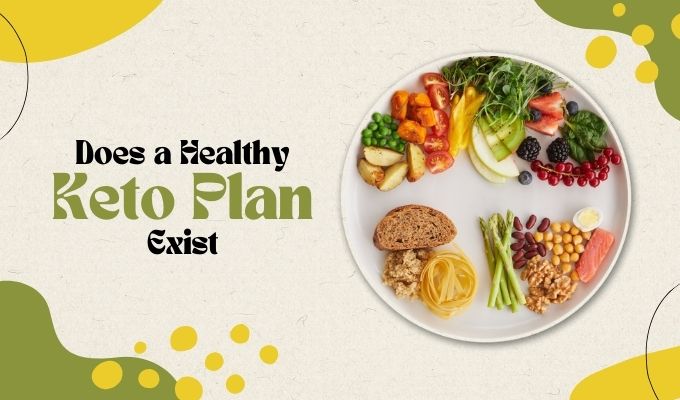Welcome to the world of keto confusion! Amidst the countless bacon-filled tales and avocado adventures, you find yourself wondering, “Does a Healthy Keto Plan Exist?” It’s a quest for the perfect balance between buttery satisfaction and well-being. Picture this: a journey where fat is your ally, carbs are the tricky foes, and finding that sweet spot is the ultimate victory. Join me as we unravel the myths, navigate through the kaleidoscope of keto advice, and discover if there’s a truly healthy keto plan waiting to be embraced. Let’s dive into the flavorful debate

and separate fact from fiction in the keto cosmos!
A Healthy Keto Diet Plan: Unveiling the Possibilities:
Embarking on a ketogenic diet can be a transformative journey, but questions often arise about its health implications. Can a keto diet truly be healthy? Let’s explore the nuances, debunk myths, and construct a balanced approach to keto eating without resorting to heading tags.
A Healthy Keto Diet Plan:
A healthy keto diet involves more than just loading up on fats and cutting carbs. Prioritize nutrient-dense, whole foods to ensure your body receives essential vitamins and minerals. Opt for quality fats such as avocados, olive oil, and nuts, and focus on a variety of low-carb vegetables to maintain balance.
Sample Healthy High-fat, Low-Carb Keto Diet Plan:
Keto Breakfast: Start your day with a spinach and feta omelet cooked in butter. Add a side of avocado for a dose of healthy fats and fiber.
Keto Lunch: Enjoy a grilled chicken salad with mixed greens, cherry tomatoes, and a generous drizzle of extra virgin olive oil.
Keto Dinner: Savor a piece of baked salmon with a side of roasted Brussels sprouts and cauliflower mash.
Keto Snacks: Keep it simple with a handful of macadamia nuts or celery sticks with cream cheese.
Nutrients Hard to Get on The Keto Diet Plan:
While keto can provide ample fats and proteins, some nutrients may be challenging to obtain. Ensure you’re incorporating sources of potassium, magnesium, and fiber. Consider supplements if necessary or include keto-friendly foods like spinach, almonds, and chia seeds.

The Potential Dangers of Keto:
Although the keto diet has gained popularity, potential risks exist. Watch out for nutrient deficiencies, particularly in fiber and certain vitamins. Additionally, some individuals may experience the “keto flu” during the initial stages, characterized by fatigue and headaches.
So, Is a Healthy Keto Diet Plan Possible?
Yes, a healthy keto diet plan is possible with mindful food choices. Focus on nutrient diversity, stay hydrated, and pay attention to how your body responds. Regular check-ups with a healthcare professional can help monitor your health throughout your keto journey.
Your Diet!
Ultimately, the success of your keto diet lies in customization. Listen to your body, experiment with different foods, and be open to adjustments. A healthy keto diet is not a one-size-fits-all approach, so tailor it to your preferences, lifestyle, and health goals.

Conclusion:
In conclusion, the question of whether a healthy keto diet plan exists is met with a resounding affirmative. By emphasizing nutrient-dense, whole foods and maintaining a thoughtful balance between fats, proteins, and carbohydrates, individuals can derive the benefits of a ketogenic lifestyle while safeguarding their overall health. The key lies in customization, mindful food choices, and a continuous awareness of the body’s response to the diet. While acknowledging potential challenges and the importance of monitoring nutrient intake, a well-crafted and personalized keto plan can indeed promote both health and adherence to the principles of this popular dietary approach. It is not about a restrictive one-size-fits-all model, but rather about crafting a sustainable, nourishing, and enjoyable keto journey that aligns with individual preferences, lifestyles, and health objectives.
FAQS:
Q1:Is there such a thing as healthy keto?
Yes, there is such a thing as a healthy keto diet. The ketogenic (keto) diet is a low-carbohydrate, high-fat diet that aims to induce a state of ketosis in the body, where it primarily burns fat for energy instead of carbohydrates. While there is evidence to suggest that the keto diet may be effective for weight loss and certain health conditions, its long-term sustainability and potential side effects are subjects of ongoing research and debate.
Q2:Is there any truth to the keto diet?
The truth about the keto diet lies in its ability to promote weight loss by restricting carbohydrate intake, leading to reduced insulin levels and increased fat burning. Some studies suggest that it may have benefits for certain health conditions, such as epilepsy and type 2 diabetes. However, it’s essential to note that individual responses to the keto diet can vary, and more research is needed to fully understand its long-term effects.
Q3:Are keto diets healthy yes or no?
Whether keto diets are considered healthy or not depends on various factors, including an individual’s health goals, existing health conditions, and the specific approach to the diet. While some people may experience positive outcomes, others may face challenges such as nutrient deficiencies and potential risks associated with high fat intake.
Q4:Is the keto diet plan nutritionally complete?
The keto diet plan can be nutritionally complete if carefully planned. It requires attention to ensure an adequate intake of essential nutrients,


